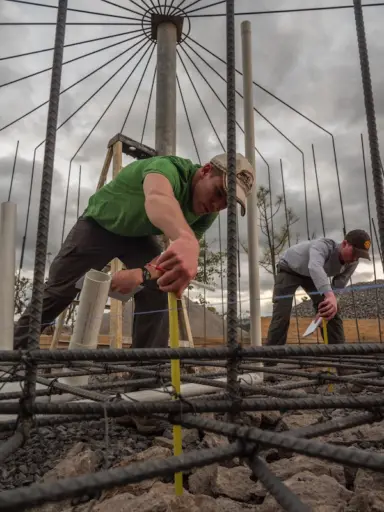They call it “water for dignity.”
The people of Zapote, Guatemala, now have reliable access to clean water thanks to the work of the University of Wisconsin-Madison student chapter of Engineers Without Borders (EWB). The project concluded in fall 2020 and is the culmination of an effort that started in 2017. More than 100 UW-Madison students and townspeople created a water system in Zapote with about 130 house connections and two distribution tanks.
 Engineers Without Borders UW-Madison students worked with locals in Zapote, Guatemala, to build a new water system that brings clean water down to the town from a nearby town. Submitted photo
Engineers Without Borders UW-Madison students worked with locals in Zapote, Guatemala, to build a new water system that brings clean water down to the town from a nearby town. Submitted photo
“We received photos of the tap stands actually working and running,” says chapter president Ryan Docter, a structural engineering graduate student who earned a bachelor’s degree in civil engineering from UW-Madison in spring 2020. “Some of these taps have a lot of really cool decorations on them. On one of the tanks, it’s painted, ‘Proyecto De Agua Potable La Dignidad’,’ which means the ‘The Water Project For Dignity’.’ That really showcases how much it means to them to have water.”
Before the project, residents from Zapote approached students in the EWB chapter while they were in the nearby town of Joyabaj. Docter says the residents came with the deeds to the water springs in hand and asked for help with building the infrastructure to access clean water.
Just 20 to 30 percent of the Zapote community had access to water prior to the project, through a mix of hand-dug wells or connections to a separate, unreliable system. Some of the houses already connected to another system had issues with improper water storage, which led to coliform contamination.
“We visited one house that was on a neighboring system and the man who lived there hadn’t received water for three months,” Docter says. “If you were on that system, you might not get water when you needed it. The community would have to rely on neighbors; if one neighbor had a tap running, it would be their responsibility to distribute water appropriately.”
The project covered a massive area, with the spring itself in nearby mountains. To get the water to the town, students and residents had to build suspended crossings—water bridges, essentially—that traversed ravines. The largest of these gaps was roughly as wide as a football field is long. Zapote’s new water system draws from water that is so clean, the only sanitation need is chlorinating it on the way to homes.
“It was a two- to three-hour hike from where the community is,” Docter says. “In order to pour the foundation, the community had to form a bucket brigade from the valley, 600 feet below, up to the crossing. It took an astounding amount of work from the residents to help construct this project.”
Docter says the Zapote project is the largest water distribution project an Engineers Without Borders student chapter has undertaken. The students handled fund-raising for the project, which ultimately cost about $120,000. They partnered with a Rotary International chapter in Guatemala that matched donations and helped secure the final $65,000 in funding for the project.
In addition to its work in Guatemala, the UW-Madison EWB chapter concluded work on a project at the Hogar Albergue de Niños Jesús de Nazaret children’s shelter in Mayaguez, Puerto Rico. It’s the chapter’s first project in Puerto Rico after establishing connections on the island in 2018.
Hurricane Maria decimated the children’s shelter in 2017, as it did much of the island. The hurricane and subsequent natural disasters, such as recent earthquakes, devastated the island’s electrical grid, which has since been prone to blackouts. For help building a solar array to provide more stable power, the shelter connected with Engineers Without Borders and the UW-Madison chapter through the Puerto Rican government.
The student chapter initiated a project to build a 25-kilowatt photovoltaic solar panel array with more than 90 panels at the shelter and oversaw the work from start to finish. In all, the project cost about $130,000.
“This was our first crack at an electrical and solar-focused project like this,” Docter says. “It’s a big deal that we were able to get it done so quickly and successfully.”
UW-Madison’s EWB chapter is one of the largest engineering student organizations at UW-Madison. It averages 130 members each year—including non-engineers, who contribute in important ways—with about 30 people per project, including those in Puerto Rico, Ecuador, Uganda and Guatemala.